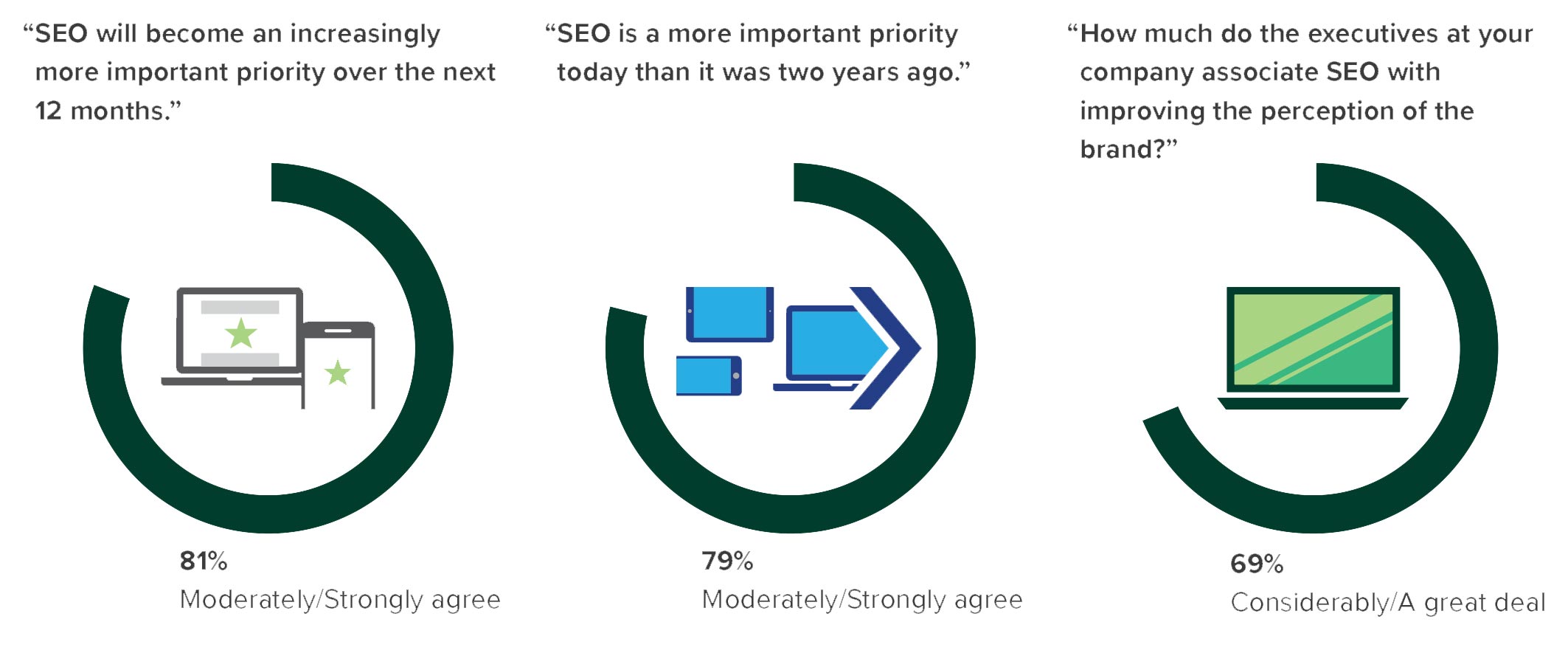The Forrester study unveils how executives and large corporations are undervaluing the importance of SEO and the impact it can have on a brands online presence.
SEO is not only a marketing vehicle to increase traffic and sales, but must be integrated into a longer term strategy to solidify brand recognition and a long lasting continuity of business growth.This study will provide you insights into integrating SEO into a marketing stack that will leverage greater business outcomes.
Forrester conducted an online survey with 266 respondents and six interviews with SEO decision makers to explore this subject. It was discovered that executive leadership sees value in SEO to enhance brand recognition, however a more holistic strategy is required in order to leverage the full potential of SEO.
SEO (search engine optimization) is the pinnacle channel for search intent acquisition, however the shift has been long changing in the realm of SEO. optimizing content and keywords is not enough, leadership must reevaluate the strategy to incorporate SEO with all marketing channels. A more holistic solution would see improvements in brand reputation, a decrease in negative mentions and enhance customer lifetime value.
Key findings
Positive content promotion
Organizations who promote positive and favorable content have witnessed a reduction in online negative sentiment. A classic example of how a firm published content regarding charitable activities, experienced an online shift to positive customer sentiment.
SEO measurement
The study discovered that even though companies are ut8lization a variety of tools to measure the impact of their SEO efforts still lack the binding element that connects the dots similar to that of a CDP (customer data platform)
The perception of how SEO plays in the longer-term strategy Marketing executives realize that SEO provides a greater customer loyalty in acquisition compared to any other marketing channel. However what most don’t realize is that the results are not immediate, conversions are faster through paid marketing but greater customer loyalty through SEO is only achieved through a consistent long term strategy, which in-tern proves to be a much more cost effective acquisition channel.
Brand reputation management through SEO
As aforementioned SEO is thought of as only improve online visibility and keyword rankings, but a lot of unfulfilled potential would be left on the table if one were to neglect that SEO can improve a brands online reputation, awareness and reduce negative sentiment. All of these factors will in turn contribute to stronger customer loyalty and grow CLV (customer lifetime value).
SEO is the tool that shapes consumer perception of the brand

- 81% of executive leaders concur that SEO provides longer-term wins than paid search.
- 74% of executive leaders believe their customers moderately to considerably tie their perception of a brand to their perception of its executives
- 69% of SEO decision makers report that the customers who come to their brand websites through SEO are more loyal and stay onsite longer than customers who come from paid search
Marketers Struggle To Make SEO A Holistic Solution For Both Brand And Performance Marketing
The barriers to making SEO a holistic solution for both brand and performance marketing:

The SEO landscape is constantly changing, google releasing new algorithms and SEO best practices are fluctuating year on year, making it difficult for companies to provide the adequate skills to stay on track.
Almost 40% of companies are using a variety of disconnected tools to measure obvious kpi’s but leave a lot of insights on the table when it comes to measuring the impact of SEO on the overall companies growth.
With budget allocation across all marketing channels, 38% of firms claim lack of budget for SEO as they overlook this entity simply because it isn’t a quick win unlike paid search.
36% of companies focus on Paid search as it provides quick wins and conversions but is vulnerable to its shortcomings. SEO however provides more customer loyalty, lifetime value and a lower cost per acquisition than paid search.
When incorporating SEO as part of the organizations marketing strategy, there needs to be a mindset shift. From Content writers, web developers, designers straight up to executives must have SEO in mind within the execution process.
Key recommendations:
Forrester’s in-depth survey of 266 global SEO decision makers and six interviews about the value of SEO to improve brand and reputational management yielded four recommended steps to improve SEO practices:
Start by understanding how your customers rely on organic search results.
To improve SEO as a channel, you need to understand the various use cases for which your customers rely on SEO. Do they use organic search results to answer questions? Find products? Get faster customer service? Once you understand your customers’ needs, you can better tailor your SEO strategy to meet those needs and build trust with those customers. This includes how they see and think about your brand’s reputation.
Promote brand protection and growth in key SEO objectives.
The most common objective is to get customers to your site, but now it is time to level up this strategy. Do you want to find more qualified leads, improve your brand awareness and perceptions, maybe dominate the market with the largest share of voice? Utilize SEO to promote your brand’s narrative and story. Leverage SEO to promote your philanthropic efforts. Maximizing your positive messaging can drown out negative search results without only having to actively suppress negative search results.
Plan for deeper integration of SEO partners to support expanding areas of SEO value across user experience and brand.
Utilizing your learnings from the first two steps, you can decide what steps you need to take to understand your customers’ needs and meet your objectives. Discern the exact role SEO will play in each step. This includes aligning the right internal partners to ensure success. We saw in our study that marketing, IT, web development, product, growth and acquisition, and sales teams all have a finger in the SEO pie. Leverage the skills and best practices across each of these teams to better understand your customers’ needs and how they can help you meet your SEO objectives without getting in the way or taking over.
Lastly, attain the tools and resources you need to support your SEO roadmap.
Half the executives in our study use a combination of in-house and agency support to manage their SEO strategies. Make sure that your agency partners are aligned to your SEO objectives and aren’t stuck in the old mindset of only seeing SEO as a traffic driver. If they cannot see the bigger picture of SEO as a brand management tool, look for partners/ agencies that align to your vision by bringing together the full landscape through unified data points and tools. When deciding what tools to use, thoroughly analyze what technology functionality you most need to address and choose a partner that best meets those needs, whether it is improving rankings, spotlighting physical locations, or connecting stakeholders. Leverage these tools and partners to reduce fragmentation and maintain a modern view into advanced SEO.
Reference: https://go.forrester.com/


